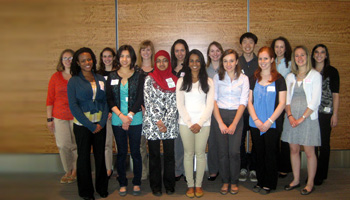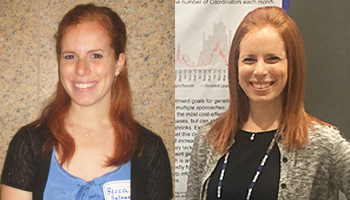HOW CAN WE HELP YOU? Call 1-800-TRY-CHOP
In This Section
CRISSP Summer Scholars Program Going Strong After 10 Years

The first class of CHOP Research Institute Summer Scholars Program.
shafere1 [at] chop.edu (By Emily Shafer)
Ten years ago, a group of curious college students arrived at Children’s Hospital of Philadelphia Research Institute, eager to spend their summer in the lab and learn more about scientific research. With that, CRISSP was born.
CRISSP — the CHOP Research Institute Summer Scholars Program — launched in 2012 with great success: The Research Institute welcomed 15 students from diverse institutions, who were paired up with mentors across a wide range of scientific disciplines. In 2014 and beyond, the program welcomed 25 students each summer to participate in a full-time mentored research experience that includes opportunities in basic, translational, clinical, and behavioral research. During the 10-week program, the students complete an independent research project.
It’s exciting when “the lightbulb goes on” in students, said longtime CRISSP mentor Ian Krantz, MD, and they see exactly what it’s like to work in translational medicine and to do research that influences children’s health. He added that one of the most fulfilling aspects of being a mentor is seeing his mentees excel in their careers after completing the CRISSP program.
“It’s really great to see these students grow and how impactful this program has been for them,” Dr. Krantz said. “I always say that I wish such a program had existed when I was an undergrad.”
Since its inception, more than 200 students have participated in CRISSP, and more than 60 CHOP faculty members have served as mentors. Many (42%) of the participants have gone on to medical or graduate school, and a third (32%) are working, either in their chosen career, gap year, or as medical residents, according to the most recent alumni data. The remainder are still undergraduates.
Building the STEM Pipeline
“We started to develop the program because there was a national effort to generate interest in STEM (science, technology, engineering, and mathematics),” said Jodi Ann Leckrone, associate director of the Office of Academic Training and Outreach Programs (ATOP) at CHOP Research Institutes. “We also saw a lot of undergraduate students at minority recruitment conferences with an interest in undergraduate internship programs.”
CRISSP’s success was almost instantaneous. When it launched, the plan was to have 10 interns from local universities: It received nearly 250 applications. Similarly, many CHOP faculty members demonstrated interest in serving as mentors from multiple disciplines, including psychology, public policy, basic science, and clinical research. The ATOP team went back to leadership who were extremely supportive in expanding the program to include 15 slots for its inaugural year.
“Being at CHOP is a huge draw for students,” Dr. Krantz said, “especially for those who know they’re interested in medical school or basic science research. The students know about the exciting breakthroughs happening here at CHOP, and really want to experience translational research firsthand.”
CRISSP now receives funding through a grant from the National Institutes of Health (NIH). Dr. Krantz, director of the Roberts Individualized Medical Genetics Center, was the principal investigator on the initial NIH grant that helped fund CRISSP. After completion of the first five-year grant cycle, Dr. Krantz and Elizabeth Lowenthal, MD, MSCE, teamed up as multi-PIs for another successful NIH grant.
“The grant supports a significant portion of the program, and leadership has always stepped up to support the rest,” Dr. Krantz said. “Dr. Bryan Wolf [former chief scientific officer] and others in CHOP leadership have recognized the importance of the program, and I think that has been key in the success of the program.”
A Unique ‘Total Immersive Experience’
Dr. Krantz has a longstanding interest in encouraging undergraduates and high school students to benefit from the experience of working in a lab and more. CRISSP does not only include time performing experiments; students also experience didactics, mentorship, lunches, and clinical rotations, and they learn how to prepare abstracts and posters.
“The design of the program and the focus on the total immersive experience for the students makes it unique and different than other laboratory internship programs,” said Dr. Krantz, who has mentored at least one student each year since CRISSP’s inception. “They are able to participate in a meaningful research project, which is complemented by clinical observerships, where they are able to witness the impact that the work they’re doing has on patients and their families.”

Chitra Mosarla, MD, was part of the first class of CRISSP participants.
Back in 2012, one of the first interns was Chitra Mosarla, MD. A genetics class in her second undergraduate year at Temple University sparked her interest in genetics research. She applied to the CRISSP program after seeing a flyer for it on campus, was accepted, and worked with Dr. Krantz as her mentor.
“During my time at CRISSP, I had a lot of good exposure to research and bench techniques,” Dr. Mosarla said. “It was a really phenomenal experience for me, and it definitely helped shaped my career. I wasn’t sure whether I wanted to pursue clinical medicine or stay primarily focused on research. While at CHOP, I was able to go into the clinic with Dr. Krantz, and that experience helped solidify my interest in clinical medicine.”
Dr. Mosarla went on to Harvard Medical School, and she completed an internal medicine residency at Massachusetts General Hospital. She will soon start a cardiology fellowship at New York University. She stressed that good mentorship is important to those pursuing science careers, and she’s grateful to have had that experience at CHOP.
“You need the right people who give you the resources and encouragement,” she said.
Mentorship is Key
Dr. Lowenthal is passionate about CRISSP in part because she started her career in a similar program at Baylor College of Medicine and Texas Children’s Hospital. Her involvement in CRISSP began with giving a talk to participants in the program. She became a mentor the following year.
Dr. Lowenthal is still in touch with most of her mentees, several of whom went on to medical school. One of her mentees joined the Peace Corps before medical school, focusing on issues relevant to global health, and two went on to do Fulbright Fellowships before medical school, one in West Africa and one in Laos.
“Being a mentor is one of the main reasons I’m here in an academic environment, rather than doing research in a non-academic environment,” Dr. Lowenthal said. “I get to have these mentees who are really fun to work with, and who I really feel like I can help get to the next level. It’s wonderful to actually play a role in these students’ lives and help them along on their journey.”
The experience is not just beneficial for the interns. As a mentor, Dr. Lowenthal also appreciates how interns often bring new ideas to her research projects.
“Some students challenge us to look at things in a different way,” Dr. Lowenthal said. “It often creates opportunities to explore areas of our data that we otherwise probably wouldn’t have explored. That is really exciting.”

Rebecca Salowe was part of the first class of CRISSP participants.
Another of the first CRISSP interns in 2012 was Rebecca Salowe, who was a Bioengineering student at the University of Pennsylvania at the time. Under the mentorship of Ian Jacobs, MD, medical director of the Center for Pediatric Airways Disorders at CHOP, Salowe worked on a project to engineer cartilage for airway reconstruction in children; this research was later published in Laryngoscope.
“During my time at CHOP, I watched my first surgery, observed clinics in the hospital, carried out a tissue-engineering project, assisted in airway surgeries with animal models, and learned how to present my research,” Salowe said. “These experiences solidified that I was most interested in pursuing a scientific career, rather than a career in medicine.”
Salowe completed a Master’s in Bioengineering at Penn and works as a scientific writer at Penn Medicine. She also appreciates the mentorship she received through CRISSP at CHOP.
“I am grateful for the formal and informal mentoring I received,” Salowe said. “Dr. Jacobs’s mentorship, and the mentorship of others I met through the program, gave me access to the experiences of people farther along in the career paths I was interested in. This information was invaluable to me.”